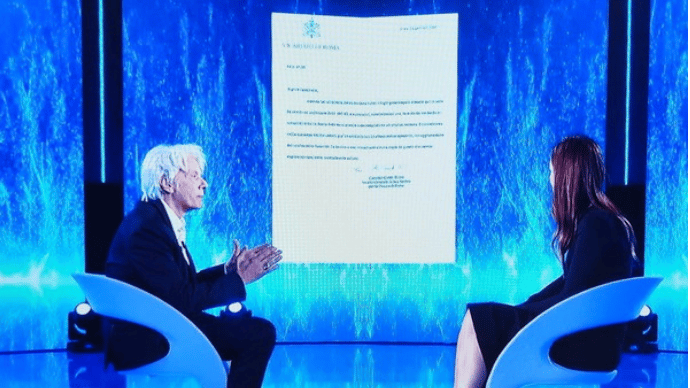In the latest twist to the long-running “Vatican Girl” drama, the brother of the 15-year-old who vanished in 1983 has revealed a purported letter from a senior Vatican cardinal a decade later suggesting Emanuela Orlandi was in London, and apparently requesting the help of an official of the British government in ending her unexpected pregnancy.
Orlandi was the daughter of a minor official in the Prefecture of the Papal Household whose family lived in a Vatican apartment, and her still-unexplained disappearance more than 40 years ago has gone on to become the premier Vatican mystery story of modern times. In 2022, it was the basis for the successful Netflix series “Vatican Girl.”
Pietro Orlandi, the brother of the missing girl, has dedicated his life to trying to find out what happened to his sister, sometimes presenting alleged bombshell evidence in the case which, upon examination, turns out to be either dubious or inconclusive.
In the case of the letter revealed Sunday, Orlandi conceded that he could not authenticate it, and in fact acknowledged that it was allegedly signed by the late Cardinal Ugo Poletti two years after he had resigned as the Cardinal Vicar of Rome. Poletti died in 1997.
There was no explanation of why a former Vicar of Rome would be corresponding with an official of a foreign government rather than someone from the Vatican’s Secretariat of State, which is the department responsible for such contacts.
The previously unknown letter is addressed to Frank Cooper, a former Under-Secretary of State and Permanent Secretary of the Ministry of Defense in the British government. Like Poletti, Cooper was actually retired by 1993, and also like Poletti, he’s no longer alive to confirm or deny the authenticity of the letter, having died in 2002.
In the supposed letter, Poletti appears to solicit Cooper’s help with an unplanned pregnancy.
“I thank you for making yourself personally available for the immediate resolution of this totally unexpected and undesired problem,” Poletti allegedly wrote.
“Miss Orlandi is the protagonist of events of primary importance in the panorama of international diplomacy, and it’s of vital importance that Miss Orlandi remain alive and in good health,” the alleged letter says.
“Although the vision of the Vatican is clear in establishing that even a fetus within the maternal womb possesses a soul, I understand her concern and, being involved myself personally, I share in part her thinking,” Poletti is alleged to have written, adding that he would leave himself for London on Feb. 24, 1993.
Orlandi presented the letter in a Sunday interview with the Italian TV program “Verissimo,” claiming it had been given to him roughly a year before by an ex-member of an Italian terrorist group from the 1970s and 80s called the “Armed Revolutionary Nuclei.”
Orlandi asserted that the person who gave him the letter claimed that his sister’s disappearance was part of a large-scale pedophile ring at the time, of which the terrorist group acted as an “operational arm.”
Speculation that Emanuela Orlandi somehow ended up in London after her 1983 disappearance from Rome has been around since 2017, when an Italian journalist named Emiliano Fittipaldi published what he claimed to be a secret five-page Vatican memo listing roughly $300,000 in expenses for maintaining Orlandi in a London residence between 1983 and 1997.
At the time, a Vatican spokesman described the purported document as “false and ridiculous.” Observers noted that, among other indications of a possible fake, the memorandum was written on plain white paper with no Vatican seal and no protocol number, some of the ecclesiastical titles it employs are incorrect, and the name of one of the clerics to whom it was supposedly addressed is misspelled.
Nevertheless, Pietro Orlandi told the TV program that he found the hypothesis that his sister spent time in London “very plausible,” and urged investigators to take it seriously.
At the moment, there are three separate inquires into Orlandi case: One by the Procurator of Rome, essentially the city’s chief prosecutor; one by the Promoter of Justice in the Vatican, an Italian attorney named Alessandro Diddi; and one by the Italian parliament.
“I am confident and I am convinced that we can do things that have not been done in the past,” Orlandi said during Sunday’s broadcast, adding that he maintains hope that his sister will be found alive despite the passage of time.
“I feel she is alive,” he said. “Until I find her remains, I will always hope to be able to find her again.”
Poletti had been linked to the Orlandi case before, based on the fact that he approved a 1990 request from the family of notorious Roman mob boss Enrico De Pedis that his remains be entombed in Rome’s Basilica of Sant’Apollinare. Over the years, there has been consistent speculation that De Pedis and his Banda della Magliana may have played a role in Orlandi’s disappearance, and in 2012 his tomb was opened to search for Orlandi’s remains.
In the end there was no trace of Orlandi, and De Pedis’s remains were removed from the basilica for cremation.

